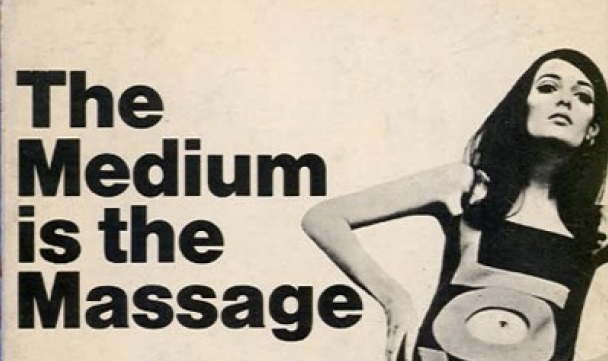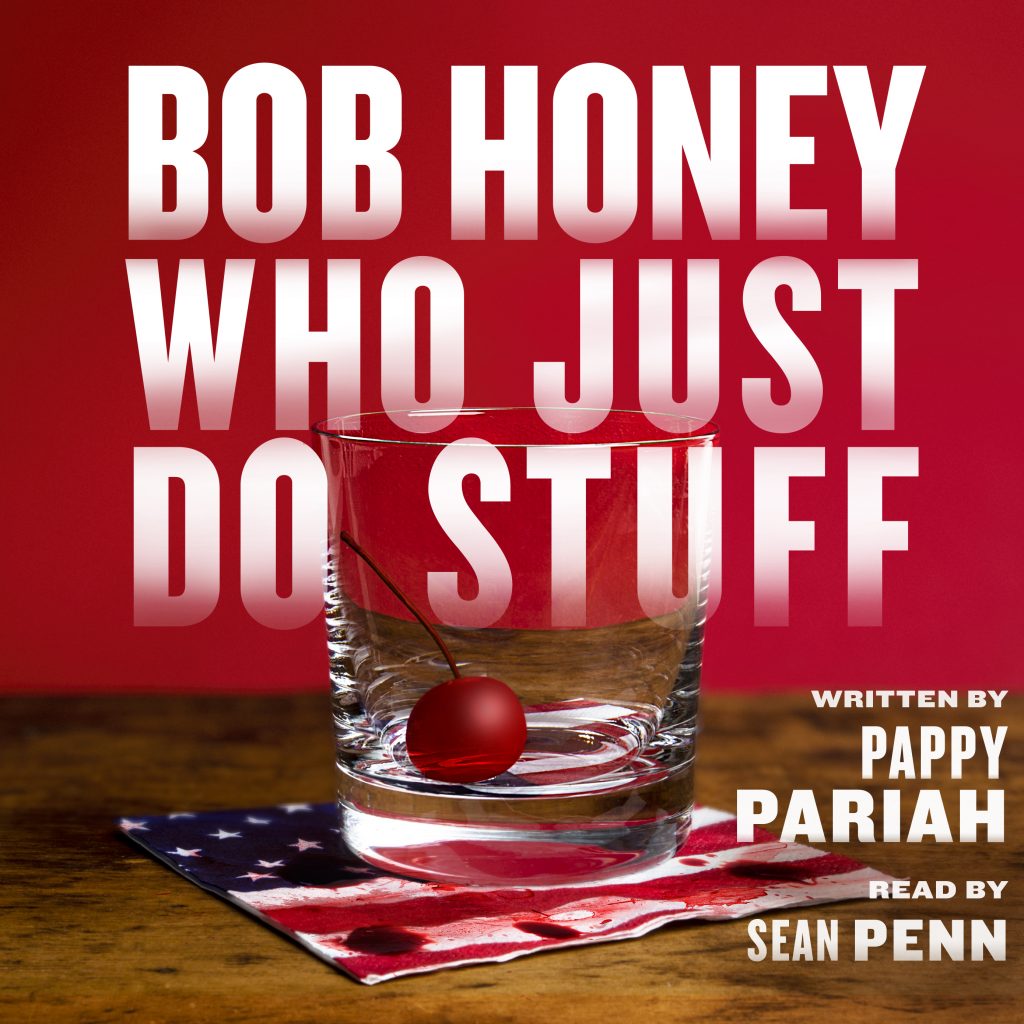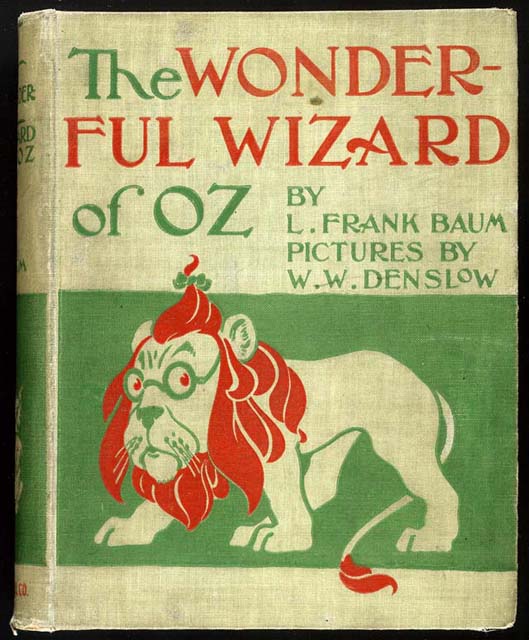Hear Marshall McLuhan’s The Medium is the Massage (1967)

Image via Wikimedia Commons
Briefly noted: In 1967, Marshall McLuhan teamed up with graphic designer Quentin Fiore to write The Medium is the Massage, a short 160-page book that offers a condensed, effective presentation of his ideas on the nature of media, communication and technology. The book was soon accompanied by an album bearing the same name, which Wikipedia describes like this:
An audio recording based on the book was made by Columbia Records in the late 1960s, produced by John Simon but otherwise keeping the same credits as the book. The recording consists of a pastiche of statements made by McLuhan interrupted by other speakers, including people speaking in various phonations and falsettos, discordant sounds and 1960s incidental music in what could be considered a deliberate attempt to translate the disconnected images seen on TV into an audio format, resulting in the prevention of a connected stream of conscious thought. Various audio recording techniques and statements are used to illustrate the relationship between spoken, literary speech and the characteristics of electronic audio media. McLuhan biographer Philip Marchand called the recording “the 1967 equivalent of a McLuhan video.
One reviewer on Amazon describes it as “more of a performance piece than a treatise.” And thanks to Spotify, you can hear it below, in full. Also find it on YouTube.
The Medium is the Massage–yes, it was originally spelled that way–will be added to our list: 1,000 Free Audio Books: Download Great Books for Free
Related Content:
Marshall McLuhan on the Stupidest Debate in the History of Debating (1976)
The Visionary Thought of Marshall McLuhan, Introduced and Demystified by Tom Wolfe
McLuhan Said “The Medium Is The Message”; Two Pieces Of Media Decode the Famous Phrase
Read More...“Alexander Hamilton” Performed with American Sign Language
Back in 2011, the Los Angeles Times ran a profile on Sarah Tubert, then a 17-year-old student who lost her hearing as a young child. With the help of her family, Sarah persevered, became a star water polo and volleyball player in high school, and earned a full scholarship to Gallaudet University–all with the hope of one day becoming an instructor for deaf and hearing-impaired students.
Five years later, Sarah is making good on her promise. Above, Sarah performs “Alexander Hamilton,” the opening number of the Broadway show, in American Sign Language (ASL). On Twitter, the Hamilton star Lin-Manuel Miranda called it “beautiful.” And it’s hard not to agree.
You can find ASL lessons in our collection, Learn 45+ Languages Online for Free: Spanish, Chinese, English & More.
If you would like to sign up for Open Culture’s free email newsletter, please find it here. Or follow our posts on Threads, Facebook, BlueSky or Mastodon.
If you would like to support the mission of Open Culture, consider making a donation to our site. It’s hard to rely 100% on ads, and your contributions will help us continue providing the best free cultural and educational materials to learners everywhere. You can contribute through PayPal, Patreon, and Venmo (@openculture). Thanks!
Read More...
Sean Penn Narrates Bob Honey Who Just Do Stuff: Download It for Free

A very quick heads up: Audible has just released a new audiobook, Bob Honey Who Just Do Stuff, written by an obscure figure who goes by the name “Pappy Pariah.” Who is Pappy Pariah? Some speculate it’s Sean Penn. But no one can say for sure. The only thing we can say is that Sean Penn narrates the audiobook. And also that you can download the audiobook for free. Click here or here, and go through the $0 purchase process.
As a quick aside, I should mention that if you start a 30 day free trial with Audible.com, you can download two free (additional) audio books of your choice. They’re professionally read, and you can keep them even if you don’t ultimately become an Audible subscriber. That said, we do heartily recommend their service. Get more details on the offer here.
Related Content:
1,000 Free Audio Books: Download Great Books for Free
Download Two Free Audio Books From Audible.com
800 Free eBooks for iPad, Kindle & Other Devices
Read More...Aleister Crowley Reads Occult Poetry in the Only Known Recordings of His Voice (1920)

Image by Jules Jacot Guillarmod, via Wikimedia Commons
Last week, we brought you a rather strange story about the rivalry between poet William Butler Yeats and magician Aleister Crowley. Theirs was a feud over the practices of occult society the Hermetic Order of the Golden Dawn; but it was also—at least for Crowley—over poetry. Crowley envied Yeats’ literary skill; Yeats could not say the same about Crowley. But while he did not necessarily respect his enemy, Yeats feared him, as did nearly everyone else. As Yeats’ biographer wrote a few months after Crowley’s death in 1947, “in the old days men and women lived in terror of his evil eye.”
The press called Crowley “the wickedest man in the world,” a reputation he did more than enough to cultivate, identifying himself as the Anti-Christ and dubbing himself “The Beast 666.” (Crowley may have inspired the “rough beast” of Yeats’ “The Second Coming.”) Crowley did not achieve the literary recognition he desired, but he continued to write prolifically after Yeats and others ejected him from the Golden Dawn in 1900: poetry, fiction, criticism, and manuals of sex magic, ritual, and symbolism—some penned during famed mountaineering expeditions.
Throughout his life Crowley was variously a mountaineer, chess prodigy, scholar, painter, yogi, and founder of a religion he called Thelema. He was also a heroin addict and by many accounts an extremely abusive cult leader. However one comes down on Crowley’s legacy, his influence on the occult and the counterculture is undeniable. To delve into the history of either is to meet him, the mysterious, bizarre, bald figure whose theories inspired everyone from L. Ron Hubbard and Anton LaVey to Jimmy Page and Ozzy Osbourne.
Without Crowley, it’s hard to imagine much of the dark weirdness of the sixties and its resulting flood of cults and esoteric art. For some occult historians, the Age of Aquarius really began sixty years earlier, in what Crowley called the “Aeon of Horus.” For many others, Crowley’s influence is inexplicable, his books incoherent, and his presence in polite conversation offensive. These are understandable attitudes. If you’re a Crowley enthusiast, however, or simply curious about this legendary occultist, you have here a rare opportunity to hear the man himself intone his poems and incantations.
“Although this recording has previously been available as a ‘Bootleg,’” say the CD liner notes from which this audio comes, “this is its first official release and to the label’s knowledge, contains the only known recording of Crowley.” Recorded circa 1920 on a wax cylinder, the audio has been digitally enhanced, although “surface noise may be evident.” Indeed, it is difficult to make out what Crowley is saying much of the time, but that’s not only to do with the recording quality, but with his cryptic language. The first five tracks comprise “The Call of the First Aethyr” and “The Call of the Second Aethyr.” Other titles include “La Gitana,” “The Pentagram,” “The Poet,” “Hymn to the American People,” and “Excerpts from the Gnostic Mass.” (Find a complete tracklist at Allmusic.)
It’s unclear under what circumstances Crowley made these recordings or why, but like many of his books, they combine occult liturgy, mythology, and his own literary utterances. Love him, hate him, or remain indifferent, there’s no getting around it: Aleister Crowley had a tremendous influence on the 20th century and beyond, even if only a very few people have made serious attempts to understand what he was up to with all that sex magic, blood sacrifice, and wickedly bawdy verse.
Aleister Crowley The Great Beast Speaks 1920 — 1936 is available on Spotify. If you need to download Spotify’s software, get it here. It will be added to our list, 1,000 Free Audio Books: Download Great Books for Free.
Related Content:
Josh Jones is a writer and musician based in Durham, NC. Follow him at @jdmagness
Read More...How to Fill the Blank Page: Advice from Jonathan Franzen, Margaret Atwood, David Mitchell & 5 Other Authors
A couple months ago we featured a video of eight writers on how to face the blank page produced by Denmark’s Louisiana Museum of Modern Art. (And if you should ever find yourself in Copenhagen with time for a bit of a train ride, I do recommend a visit to the museum itself.) Now, Louisiana has released eight separate videos, each offering one notable writer’s viewpoint on that scariest of all confrontations in their profession. But as The Corrections and Freedom author Jonathan Franzen puts it, “the blank page in the mind has to be filled before you have the courage to face the actual blank page.”
“If you say, ‘I want to write,’ and turn on the computer and look at the blank page, it’s over. It’s not going to happen,” says the man who somehow manages to turn out his weighty, American-zeitgeist-capturing novels faster as the years go by. “It’s when you have had a thought in the shower before, you’ve woken in the middle of the night, and suddenly you have a sentence or two — you have something. You’ve already written it in your mind.” In contrast, the even more experienced and prolific Margaret Atwood, author of The Handmaid’s Tale and Oryx and Crake, sees “something compelling about the blank page that beckons you in to write something on it. It must be filled,” whether or not you’ve filled your mind already.
She likens this phenomenon to “an invitation, but it’s an invitation to something like going swimming in a very cold lake. So you approach it in a similar fashion: you put your toe in, you change your mind, ‘Maybe I won’t do that,’ you put your foot in, ‘Really, do I want to do that?’ You come back, and finally you just run screaming and you plunge in. Unless you plunge in, you’re never going to begin.” The immensely imaginative number9dream and Cloud Atlas author David Mitchell uses a different metaphor: “A blank page is a door. It contains infinity, like a night sky with a supermoon really close to the Earth, with all the stars and the galaxies you can see — it’s very, very clear, maybe at a high altitude. You know how that just makes your heart beat faster?”
If that image doesn’t get you writing, Mitchell has another: “A slightly overweight, bald boss saying, “It’s time to work. Get to work, come on. You’re supposed to be a writer, aren’t you? You can’t just sit around on your fat arse waiting to be inspired, waiting for creativity. You’re stuck? Fine. Why are you stuck? Why isn’t this working? Why can’t you push on with this scene? What are you trying to hold on to what just isn’t working here? Be more honest.’ ” Have a look at the series’ entire playlist (embedded above), which also features Joyce Carol Oates, Lydia Davis, and others, and you’ll find as many strategies for battling the blank page as writers who win that battle. Whether you use ideas thought up in the shower, plunge straight into the lake, or stare up at the night sky or a bothersome boss, only one thing matters: that your page ends up with some words on it.
Related Content:
Stephen King Creates a List of 96 Books for Aspiring Writers to Read
The Daily Habits of Famous Writers: Franz Kafka, Haruki Murakami, Stephen King & More
Ray Bradbury Gives 12 Pieces of Writing Advice to Young Authors (2001)
Based in Seoul, Colin Marshall writes and broadcasts on cities and culture. He’s at work on a book about Los Angeles, A Los Angeles Primer, the video series The City in Cinema, the crowdfunded journalism project Where Is the City of the Future?, and the Los Angeles Review of Books’ Korea Blog. Follow him on Twitter at @colinmarshall or on Facebook.
Read More...Free Audio Book: Joseph Conrad’s Heart of Darkness, Read by British Actor Hayward Morse

Selected by the Modern Library as one of the 100 best novels of all time, Joseph Conrad’s Heart of Darkness was originally published as a three-part serial story in Blackwood’s Magazine in 1899, then later as a novella in the 1902 collection Youth: A Narrative; and Two Other Stories. A complex and controversial “meditation on colonialism, evil, and the thin line between civilization and barbarity,” Heart of Darkness gained literary stature during the 1950s and 1960s, before peaking in the late 1970s–precisely around when Francis Ford Coppola released Apocalypse Now, a film loosely based on Conrad’s tale. What halted the novella’s momentum was a stinging rebuke from Chinua Achebe, father of modern African literature, who criticized the way it “projects the image of Africa as ‘the other world,’ the antithesis of Europe and therefore of civilization…”
Despite the controversies surrounding the text, Heart of Darkness remains widely read in American high schools and universities. And, notes Harold Bloom, it has “had a striking influence on writers, artists, and thinkers from all over the globe.” Below, you can listen to a reading of Heart of Darkness by British stage and voice actor Hayward Morse. It’s free on Spotify and will be added to our list, 1,000 Free Audio Books: Download Great Books for Free. In November, Kenneth Branagh will release his own version–which you can download for free if you join Audible.com’s 30 free trial program. Other free readings of Conrad’s novella can be found on Librivox.
Related Content
Orson Welles Turns Heart of Darkness Into a Radio Drama, and Almost His First Great Film
800 Free eBooks for iPad, Kindle & Other Devices
Read More...Learn to Code with Harvard’s Popular Intro to Computer Science Course: The 2016 Edition
This fall, Harvard has been rolling out videos from the 2016 edition of Computer Science 50 (CS50), the university’s introductory coding course designed for majors and non-majors alike. Taught by David Malan, a perennially popular professor (you’ll immediately see why), the one-semester course (taught mostly in C) combines courses typically known elsewhere as “CS1” and “CS2.”
Even if you’re not a Harvard student, you’re welcome to follow CS50 online by heading over to this site here. There you will find video lectures (stream them all above or access them individually here), problem sets, quizzes, and other useful course materials. Once you’ve mastered the material covered in CS50, you can start branching out into new areas of coding by perusing our big collection of Free Online Computer Science Courses, a subset of our larger collection, 1,700 Free Online Courses from Top Universities.
If you would like to sign up for Open Culture’s free email newsletter, please find it here. Or follow our posts on Threads, Facebook, BlueSky or Mastodon.
If you would like to support the mission of Open Culture, consider making a donation to our site. It’s hard to rely 100% on ads, and your contributions will help us continue providing the best free cultural and educational materials to learners everywhere. You can contribute through PayPal, Patreon, and Venmo (@openculture). Thanks!
Related Content:
Free Textbooks: Computer Science
Free Online Computer Science Courses
Codecademy’s Free Courses Democratize Computer Programming
Read More...Watch Benedict Cumberbatch Sing Pink Floyd’s “Comfortably Numb,” with David Gilmour Live on Stage
Around here, when we talk about Benedict Cumberbatch, we usually talk about his knack for reading classic texts–Kafka’s Metamorphosis, Melville’s Moby-Dick, a poignant letter by Alan Turing, even passages from a Guantánamo prisoner’s diary. But today we’re putting another one of his talents on display.
Above, watch Cumberbatch join David Gilmour live on stage to perform Pink Floyd’s 1979 song, “Comfortably Numb.” The performance took place last night at London’s Royal Albert Hall. Enjoy.
Note: You can download free audiobooks read by Benedict Cumberbatch if you sign up for a 30-Day Free Trial with Audible.com. That includes readings of Sherlock Holmes, Jane Austen and Neil Gaiman. Find more information on Audible’s Free Trial program here.
Related Content:
Pink Floyd’s David Gilmour Sings Shakespeare’s Sonnet 18
Ultra Orthodox Rabbis Sing Pink Floyd’s “Wish You Were Here” on the Streets of Jerusalem
Read More...When L. Frank Baum’s Wizard of Oz Series Was Banned for “Depicting Women in Strong Leadership Roles” (1928)

We’ve reached the final stretch of the most infuriating, unsettling election I’ve ever experienced. And we find the U.S. so polarized that—as The Wall Street Journal chillingly demonstrates in their “Blue Feed Red Feed” feature—the left and right seem to live in two entirely different realities. Still, one would have to work very hard on either side, I think, to deny the role sexism has played. One candidate, a known and well-documented misogynist, leads millions of supporters calling for his opponent’s death, imprisonment, and humiliation. That opponent, of course, happens to be the first woman to run on a major party ticket in a general election.
Do many Americans still have a problem with accepting women as leaders? I personally don’t think there’s much of an argument there, and people who see the question as redundant marvel at how long archaic attitudes about women in power have persisted. At least these days we can openly have the—often highly inflamed—conversation about sexism in business, entertainment, and government. And we can support a cultural industry thriving on strong female characters in fiction, film, and television. Not so much in 1928, when the Chicago Public Library banned The Wizard of Oz, writes Kristina Rosenthal at the University of Tulsa Department of Special Collections, “arguing that the story was ungodly for ‘depicting women in strong leadership roles.’”
First published in 1900, L. Frank Baum’s fantasy novel initiated a series of 13 Oz-themed sequels, all of which became immensely popular after MGM’s 1939 film adaptation. (You can find them all in text and audio format here.) And yet, “throughout the years the books have been opposed for their positive portrayals of femininity.” Various libraries used similar excuses to ban the books throughout the 50s and 60s. The Detroit public library banned the Oz books in 1957, stating they had “no value for children of today.” The ban remained in place until 1972. One Florida librarian circulated a memo to her colleagues calling the books “unwholesome,” among other things, and causing a run on local bookstores as children desperately tried to find them.
Other groups decided that the books promoted witchcraft in charges similar to those levied at the Harry Potter series. In 1986, a group of Fundamentalist Christian families in Tennessee came together to remove the The Wizard of Oz from their schools’ curriculum, protesting “the novel’s depiction of benevolent witches.” They argued, writes Rosenthal, “that all witches are bad, therefore it is ‘theologically impossible ‘for good witches to exist.” Many seeking to ban the books since have similarly referred to their positive depictions of magic and “godless supernaturalism,” but the Tennessee case stands as a landmark in the Religious Right’s litigious crusade against the government. The attorney who represented plaintiff Vicki Frost called on “every born-again Christian to get their children out of public schools.”
It’s odd to think of whimsical children’s literature so seemingly innocuous as The Wizard of Oz books as territory in the long culture wars of the 20th century. But as we are reminded every year during Banned Books Week (September 25 − October 1, 2016), literature often arouses the ire of those incensed by change and difference. Yet their attempts to suppress certain books have always backfired, making the targets of their censorship even more popular and sought-after. If you’d like to read Baum’s Oz books now, you needn’t confront a gatekeeping librarian; simply head over to our post on the complete Wizard of Oz series, with free eBooks and audio books of all 14 female-centric fantasy classics.
Related Content:
800 Free eBooks for iPad, Kindle & Other Devices
The Complete Wizard of Oz Series, Available as Free eBooks and Free Audio Books
74 Free Banned Books (for Banned Books Week)
1,000 Free Audio Books: Download Great Books for Free
Josh Jones is a writer and musician based in Durham, NC. Follow him at @jdmagness
Read More...8+ Hours of Classic Charles Dickens Stories Dramatized, Starring Orson Welles, Boris Karloff, Richard Burton & More
Do you know who would have understood our current political moment? Who would have known how to make sense of the naked avarice, widespread bullying, demagoguery, and predatory politicking? Charles Dickens, that’s who.
The villainy in Oliver Twist alone suffices to show just how well Dickens understood misogyny, criminal exploitation, and the ways seductive insincerity works to ensnare the vulnerable.
As we approach the interminable holiday season, many of us will reflect on Dickens’ scathing indictment of greed in A Christmas Carol. Nearly everyone wants a piece of Dickens’ presumed political views. The Socialist Review proclaims “he would have been only too familiar with the shameless piling up of wealth, the poor struggling to survive, the penny pinching of welfare, and the lofty contempt of our rulers” in the 21st century.
But Dickens was no revolutionary. His foreign policy ideas “anticipate Kipling’s proletarian defenders of empire,” and he might have fit right in with the most starry-eyed of neoconservatives.
Was he a defender of free market ideals, as some allege? The idea seems implausible. Characters like pre-redemption Scrooge and Ralph Nickleby—who in, say, Ayn Rand’s hands might be champions of individualism and selfishness as a virtue—become in Dickens’ novels examples of frighteningly truncated humanity. Take this description of Nickleby, uncle of the orphaned Nicholas:
He wore a sprinkling of powder upon his head, as if to make himself look benevolent; but if that were his purpose, he would perhaps have done better to powder his countenance also, for there was something in its very wrinkles, and in his cold restless eye, which seemed to tell of cunning that would announce itself in spite of him.
This is the look of the deceitful, scheming businessman in Dickens: the cold eyes, the barely-concealed malice. In novels like Oliver Twist and Hard Times, Dickens “provides a damning critique of industrial England of the nineteenth century” and “an indictment of global laissez faire capitalism of the twenty-first century.” So argues The Copperfield Review, in any case.
But when we read Dickens, we don’t do so foremost to have our political views bolstered or challenged, but to experience the immensely moving and entertaining plots, with their vividly delineated characters like Ralph Nickleby above. These qualities have always made Dickens’ work translate beautifully to the stage and screen, and also to the radio waves, where Dickens appeared in dramatic adaptations during the medium’s golden age and beyond, often in star-studded productions.
For example, at the top of the post, you can hear a 1950 radio play of David Copperfield with Richard Burton in the title role and Boris Karloff as “the smarmiest creep in Dickens,” Uriah Heep. The latter character may be one of the most obsessively described in all of the author’s works, to the point of caricature. And yet, writes Sam Jordison at The Guardian, “just as Satan gets the best lines in Paradise Lost, Heep gets some of the best moments in David Copperfield.”
Further up, you can hear Orson Welles star in a 1938 production of A Tale of Two Cities. This play is the third in Welles and John Houseman’s series The Mercury Theatre on the Air, which featured Welles’ handpicked company of actors. Soon sponsored by Campbell’s Soup, the program was renamed The Campbell Playhouse by the time Welles produced an adaptation of A Christmas Carol with Lionel Barrymore as Scrooge.
In the Spotify playlist above, hear that production as well as a second Welles-starring version of A Tale of Two Cities recorded in 1945 for the legendary Lux Radio Theater. You’ll also find Richard Burton’s David Copperfield and classic productions of Great Expectations, Oliver Twist, The Pickwick Papers, The Mystery of Edwin Drood, and short stories like “The Queer Client,” “The Signalman,” and “The Trial for Murder.” If you need Spotify’s free software, download it here.
Visiting, or revisiting, the Dickensian world through radio plays fits in perfectly with the author’s own mode of disseminating his fiction: he was a showman who loved to give readings of his work “with full histrionic brilliance,” writes Simon Callow, “and stage-managed to a point of high theatricality.” And through such entertainment, he believed, he might move readers and audiences with his critiques of the exploitative systems of his day.
The playlist above will be added to our collection, 1,000 Free Audio Books: Download Great Books for Free. Copies of Dickens’ works can be found in our collection, 800 Free eBooks for iPad, Kindle & Other Devices.
Related Content:
An Animated Introduction to the Life & Literary Works of Charles Dickens
Hear Charles Dickens’ A Christmas Carol Read by His Great-Granddaughter in His Preferred Style
Charles Dickens’ Hand-Edited Copy of His Classic Holiday Tale, A Christmas Carol
Josh Jones is a writer and musician based in Durham, NC. Follow him at @jdmagness
Read More...

